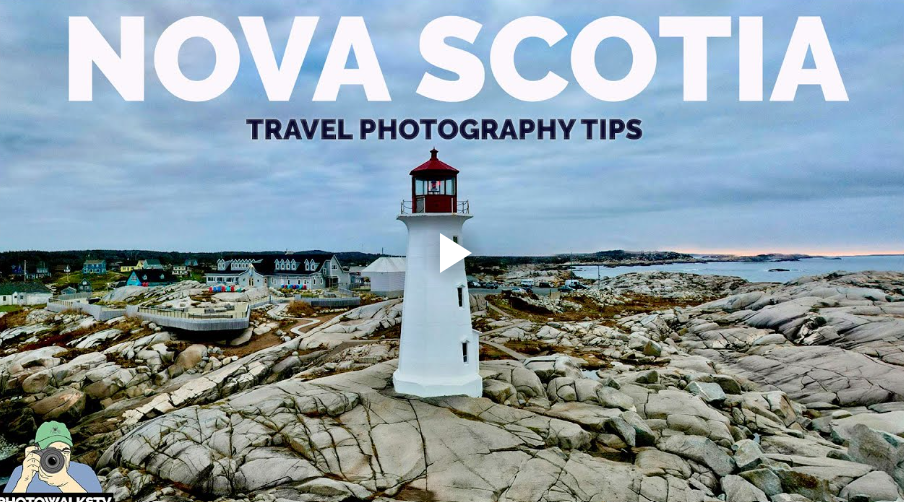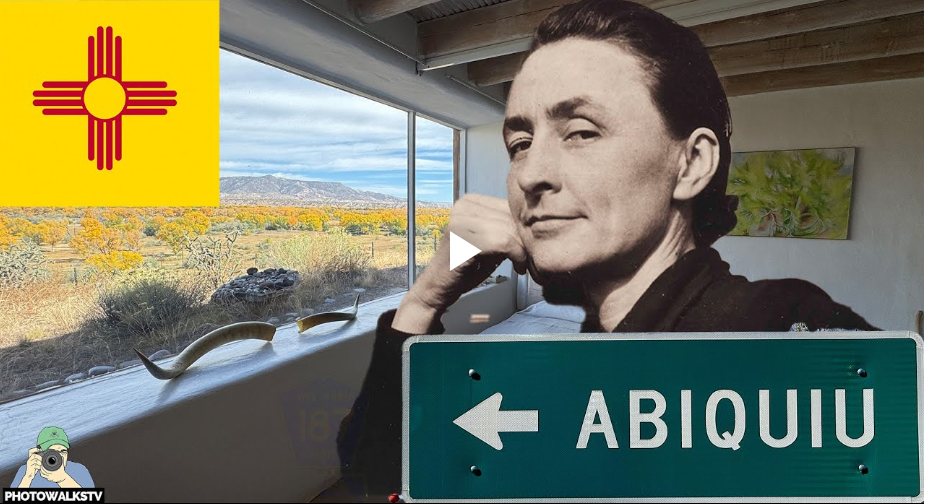
🇨🇦 Nova Scotia Travel Photography Tips
October 28, 2023A 10 Day Timelapse Video by the sea!
November 3, 2023After 9 days visiting the Canadian Maritime province of Nova Scotia for the first time, I can help you with your planning, and cut to the chase. The province is huge, and for those of us who don’t live there, figuring out where to go, and for how long, was daunting in setting up the trip.
Nova Scotia is a Maritime province, with stunning coastal views, iconic storybook fishing villages and a love of traditional Scottish music. It’s near the Maine coast and the province of New Brunswick.
- If you just have a few days, do the south ultra colorful villages of Mahone Bay, Lunenburg and Peggy’s Cove, and you’ll have a ball.
- If you can stay longer, get yourself up north to Cape Breton, the musical town of Baddeck and stunning beauty of the Cabot Trail.
We scratched the surface on this visit, and frankly couldn’t see everything we wanted to, but look forward to returning in 2024 for a second chorus.

We started the journey by taking the big CAT ferry from Bar Harbor, Maine for a three and a half hour cruise to the fishing village of Yarmouth. Many we met had flown into Halifax, which is near the tiny Peggy’s Cove.
Mahone Bay: A really cute little town right out of the New England playbook known for ultra-bright colors of its homes and storefronts, and a bay featuring three iconic churches back to back. As I explain in the video, morning can afford you really nice reflection shots of the church in the water. To get the 3 church shot, you’ll need to go to the overlook just down the road from town.
Lunenburg: When you think quintessential Nova Scotia fishing town with day glo pop art colors welcoming the fishermen from the water, this is it. (To get that shot, just type “Lunenburg Photo Spot” into Google Maps and it will magically take you right on the outskirts of town, to an overlook popular with tourist buses. Have no fear, the shot is great, but if you’re willing to step out into the water onto the marsh–don’t worry, it’s dry–you’ll get closer.) It doesn’t get cuter than Lunenburg, which has several blocks of seaside shops.
Peggy’s Cove: The highlight of any Nova Scotia trip, unless you’re on a tour bus, which will only give you 30-45 minutes to enjoy yourself. Stay overnight! Or drive in and spend the day from Mahone Bay or Lunenburg. Peggy’s is a really fun little fishing village with cute shops and galleries, and salty dog fishing momentos.
It’s also home of the most photographed lighthouse in Canada, Peggy’s Point, built in 1914, and it’s beloved for its perch on the rocks overlooking the ocean. There are so many great photo opps to get shots of Peggy. All you have to do is move around to change your angles. I did timelapses, videos, late night photos with stars, you name it. Peggy was such a cool subject.
The town itself only has 29 residents, ironic as over 700,000 come to visit each year. In the video, I have a fun interview with one of the 29 residents, Nicole Campbell, whose family owns the local restaurant, food shop and an amazing Airbnb across the street from Peggy’s Point.

Truro/Burntcoat. The highest tides in the world can be seen here, in a twice a day phenon called a “Tidal Bore.” In Truro, you can watch the boar (check your tide tables) and at Burntcoat Head National Park, you can walk the muddy ocean floor after the water subsides. And nearby is a really cool lighthouse at the Five Islands park.
Halifax. Some 50% of the peninsula’s population lives in the city here, home to a dynamic waterfront area that’s fun to walk by, but frankly, our trip was about small towns, so we didn’t spend much time here.

Baddeck. A “resort” area with many motels and inns to stay in, restaurants, a big grocery store, yet small town life. We found the area chock full of traditional music, with the cèilidh happening every night during the season, and close access to the scenic Cabot Trail and other fun towns. Highly recommended. We stayed at the the fantastic Auld Farm B&B, and loved every minute of it. (Great people, food, room, setting, you name it.) Watch the morning jig jam we were privileged to see during our visit on the video. The Gaelic college, where they have week ceilidh events, and all-night jam sessions during the October Celtic Colors festival, is nearby.
Cabot Trail. The “Big Sur” of Nova Scotia, a long scenic drive with multiple hikes and if you’re not into that, just stare out the window and gawk at the view.

We stayed in Ingonish at the fabulous Castle Rock Country Inn (ocean views, amazing food, fantastic people) on the northern part of the island, which puts you in close proximity to the Cape Breton Highlands National Park, the best views and all those great roadside shops, like Sew Inclined for hats and the Groovy Goat for unique soaps. That’s Barbara Longva the hat maker from Sew Inclined below.

Sydney. We didn’t make it here, but this is the second largest city on Nova Scotia, and about an hour’s drive from Baddeck.
Judique: More music here, as the town is the site of the Celtic Music Interpretive Centre and was settled by migrants from the Scottish Highlands in the late 1700s.I want to go there next year!
French! Cheticamp, is on the French, Acadia side of the island, and is described as a traditional Acadian fishing village situated along the picturesque Cabot Trail, nestled between the highlands of Cape Breton Island and the waters of the Gulf of St. Lawrence. Per the tourist office: “This charming village offers a taste of French heritage, beautiful scenery and a friendly bilingual reception from its residents.” Nearby is Louisbourg, a reconstructed 18th-century French fortified town, nearby. Louisbourg was built as a fortress town to defend the territories of New France.

Thank you Nova Scotia for the trip of a lifetime. The nice folks at Novascotia.com were extremely helpful in setting up the trip. If you go, don’t forget to contact them.
For more:
(Read Ruth Stroud’s take on Nova Scotia: https://ruthtalksfood.substack.com/p/postcards-from-nova-scotia-part-2)
Photo gallery: https://www.jeffersongraham.net/Jefferson-Graham-Portfolio/Photowalks-2023/Nova-Scotia/

 Scripps News
Scripps News



